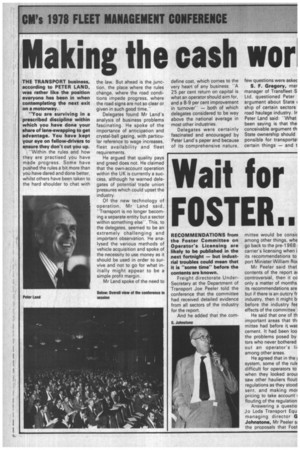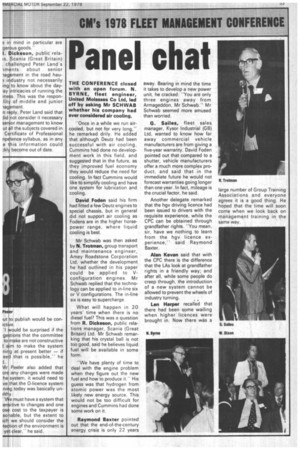Making the cash wor
Page 34

Page 35

If you've noticed an error in this article please click here to report it so we can fix it.
THE TRANSPORT business, according to PETER LAND, was rather like the position everyone has been in when contemplating the next exit on a motorway.
"You are surviving in a prescribed discipline within which you have done your share of lane-swapping to get advantage. You have kept your eye on fellow-drivers to ensure they don't cut you up.
"Within the rules and how they are practised you have made progress. Some have pushed the rules a bit more than you have dared and done better, whilst others have been taken to the hard shoulder to chat with
the law. But ahead is the junction, the place where the rules change, where the road conditions impede progress, where the road signs are not so clear or given in such good time.
Delegates found Mr Land's analysis of business problems fascinating. He spoke of the importance of anticipation and crystal-ball gazing, with particular reference to wage increases, fleet availability and fleet requirements.
He argued that quality pays and greed does not. He claimed that the own-account operation within the UK is currently a success, although he warned delegates of potential trade union pressures which could upset the industry.
Of the new technology of operation, Mr Land said, "Transport is no longer becoming a separate entity but a sector within something else-. This, to the delegates, seemed to be an extremely challenging and important observation. He analysed the various methods of vehicle acquisition and spoke of the necessity to use money as it should be used in order to survive and not to go for what initially might appear to be a simple profit margin.
Mr Land spoke of the need to
define cost, which comes to the very heart of any business: -A 25 per cent return on capital is what an operator should aim for, and a 8-9 per cent improvement in turnover— both of which delegates considered to be way above the national average in most other industries.
Delegates were certainly fascinated and encouraged by Peter Land's paper and because of its comprehensive nature, few questions were askec
S. F. Gregory, mar manager of Transfleet S Ltd, questioned Peter argument about State ship of certain sectors road haulage industry. Ir Peter Land said -What been saying is that the conceivable argument th State ownership should ponsible for transportai certain things — and t
a in mind in particular are gerous goods."
I Dickeson, public relais, Scania (Great Britain) , challenged Peter Land's iments about senior lagement in the road hau? industry not necessarily ing to know about the dayay ntricacies of running the iness. This was the responlity of middle and junior iagement.
n rrly, Peter Land said that iid not consider it necessary sen or management to know ut all the subjects covered in Certificate of Professional npetence syllabus, as in any e this information could :kly become out of date.




























































































































